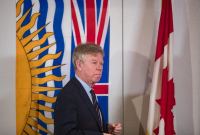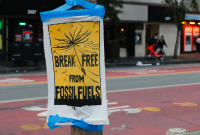Support strong Canadian climate journalism for 2025
In the most recent federal budget, Ottawa announced much-needed tools to fight money laundering. The biggest announcement was to accelerate the timeline for a corporate beneficial ownership registry by 2023. That date is significant because it's two years earlier than anticipated and includes the participation of willing provinces and territories.
The federal government also announced a beneficial ownership property registry, which would also involve discussions with the provinces; moreover, lenders issuing mortgages will be required to adhere to anti-money laundering regulations. Together, these announcements are game-changing hits against Canada’s money laundering, or “snow-washing” problem, a term coined by Toronto Star investigative journalists describing how money is laundered into the country.
How bad is Canada’s snow-washing problem? Criminal Intelligence Service Canada estimates that $45 billion to $113 billion are laundered through our economy each year, with Canadian shell companies and properties being used to hide dirty money.
The true owner of a cannabis company might not be a person, but rather a limited partnership called British Columbia LP 1234, as an example. Behind British Columbia LP 1234 might be another limited partnership, British Columbia LP 5678. Finally, behind that, you may have the beneficial owner “Bob” — but who is Bob? Without a beneficial ownership registry that is publicly accessible, it is difficult to know if Bob is a tax dodger, a drug trafficker or a recently sanctioned Russian oligarch.
A beneficial ownership registry is a company directory that lists information about the ultimate owners of companies and trust arrangements. To date, 106 countries worldwide have committed to making sure these registries are publicly accessible, free and searchable in order to prevent criminals from abusing companies to launder money.
Incorporating a numbered company is not illegal, nor does it mean that revenues flowing through are dirty. Yet, the extent of numbered companies acquiring property in Canada raises red flags, and it’s not just a problem in cities like Vancouver. Between 2008 and 2018, our research found that $28.4 billion in properties were acquired through corporate entities in the Greater Toronto Area.
Furthermore, $10.4 billion in mortgages were issued to corporations through private lenders who aren’t required to adhere to Canada’s anti-money laundering regulations. Our newest research also shows that international corporate service providers have been marketing Canada as a safe haven to clients for years and advertising Canadian Limited Partnerships as the preferred vehicle for hiding money in order to avoid tax.
Ottawa’s commitment to a publicly accessible beneficial ownership registry includes ensuring provinces and territories can participate in a registry system. As the vast majority of companies are registered within provinces, Ottawa will need to offer a blueprint the provinces can get behind. On Wednesday, B.C.’s Cullen Commission released its final report recommending the province create a publicly accessible registry. This is why B.C. Finance Minister Selina Robinson should signal to Ottawa that the province will be a willing participant in a central registry system that is pan-Canadian.
Federal Finance Minister Chrystia Freeland regularly meets with her provincial counterparts, and can reach an agreement with provinces to allow provincially registered companies to send beneficial ownership information directly to a central registry. To do this seamlessly, Ottawa can make legislative amendments to the Canada Business Corporations Act and provinces can mirror that same legislation in their own business acts. In 2017, Ottawa used this same approach as a preliminary step to co-ordinate the collection of beneficial ownership information amongst provinces.
With a central registry, provinces would not have to devote resources to upgrading their own business registries and provincial authorities can access the back-end of the registry for investigations. Provinces can also use the registry to track down provincial companies (even properties) that might be owned or controlled by people on sanctions lists and reap substantial revenues from asset forfeitures.
Ottawa leading the design, staffing and maintenance of a registry would be practical for a number of reasons.
First, it would be appealing to smaller provinces that might not have the resources to collect and scrutinize beneficial ownership information.
Second, Ottawa can start the work with willing provinces and eventually expand the registry to cover the entire country to ensure there are no weak spots that could be exploited by criminals.
And finally, businesses having access to a free and searchable registry with verified data can reduce administrative costs to carry out due-diligence checks and improve compliance with federal regulations.
As G7 and G20 countries roll out public registries, Canada cannot be left behind due to its federated composition. A centralized beneficial ownership registry for companies that is publicly accessible, searchable, free-of-cost, and with verified data would send a powerful signal to criminals and corrupt foreign officials that Canada is no longer a dumping ground for the world’s dirty money.
Now is the time for all provinces to step up.
Sasha Caldera is the beneficial ownership transparency campaign manager at Publish What You Pay Canada.
James Cohen is the executive director of Transparency International Canada.







Comments
My only question is -- why was this not done decades ago?
Because all the political parties that have ever formed government in Canada depend for their financing on rich people and corporations who want to avoid taxes, and at the MP and party operative level are mostly well off themselves so they have a direct personal interest in not reining in the activities of the wealthy.
My opinion is, if there is property in Canada, and the government (like say CRA), after a serious good faith effort, cannot figure out who actually owns it . . . the government does now. You don't like it? Step up and claim it and prove it and pay your taxes.